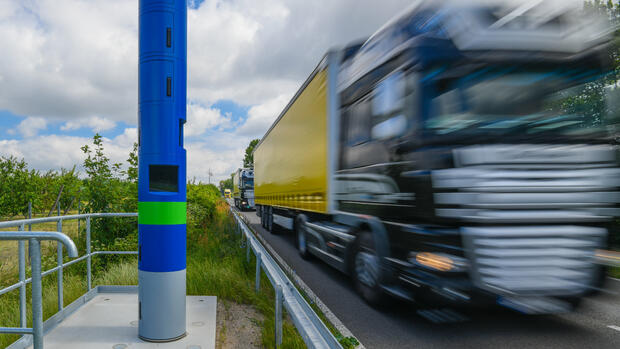Berlin Freight forwarders and logistics service providers warn Federal Transport Minister Volker Wissing (FDP) against introducing the planned doubling of the truck toll at the end of the year. Above all, they criticize the increase in price due to a climate component, according to which the emission of carbon dioxide (CO2) and thus the prevailing diesel trucks should be burdened. So far, there have been hardly any trucks with alternative drives. Wissing should work to introduce the toll increase in 2025 at the earliest.
On the planned start date of the additional CO2 toll rates on December 1, 2023 and also in the following years, neither “marketable vehicles with alternative drives in sufficient numbers nor the necessary public and private tank and charging infrastructure would be available”, writes Axel Plass, President of the Federal Association Forwarding and logistics in a letter to the FDP politician. It is available to the Handelsblatt.
The CO2 surcharge will “only serve to improve the federal budget” and reduce the already low margins. This has a “negative effect on the liquid funds of many transport service providers and fleet operators, which are urgently needed for the green transformation”, as DSLV President Plass writes. A start in 2025, on the other hand, would give companies planning security.
The Ministry of Transport had sent the draft for a new federal trunk road toll law to the associations on Wednesday and asked for a statement within 24 hours. The draft envisages almost doubling the toll from around eight billion euros a year today to more than 15 billion euros. In the future, light commercial vehicles weighing more than 3.5 tons will also have to pay the toll.
On May 10, the federal cabinet is to adopt the draft and with it the reform of the climate protection law, an immediate climate protection program and the reform of road traffic law. The SPD, Greens and FDP agreed on these points during their marathon of negotiations at the end of March.
Germany must almost halve its emissions from traffic by 2030. Freight transport by road causes a particularly large amount of carbon dioxide. Until now, the truck toll, graded according to emission classes, has meant that transport companies are increasingly switching to the most modern types of vehicles with diesel combustion engines.
“The CO2 toll will not have any foreseeable effect on the climate in the next few years”
According to the transport industry, a changeover to lower-emission vehicles will not succeed with the climate toll. The Federal Association of Road Haulage, Logistics and Disposal (BGL) refers to figures from the Federal Motor Transport Authority.
According to this, at the beginning of the year only 0.6 percent of vehicles weighing more than 3.5 tons were battery-electric or fuel cell powered. In the case of the heavy trucks, which transport the majority of the goods, only 0.03 percent of the tractor units were equipped with such drives.
>> Read here: California wants to ban the purchase of diesel trucks
“The delivery times of the commercial vehicle manufacturers are also extremely long for heavy trucks in this segment and are often more than a year – if a specific delivery date is given at all,” said CEO Dirk Engelhardt. With the toll, something is being sold as a climate protection measure that is not at all. “The CO2 toll will not have any impact on the climate in the next few years.”
DSLV President Plass accuses the federal government of using the additional toll to “aim for the complete displacement of diesel technology in favor of electric or hydrogen-powered trucks”. However, “green fuels” such as biogas are not taken into account. However, they could be helpful as transition fuels on the way to climate-neutral freight transport until other drives are ready for the market.
Industry: “Green” commercial vehicles and green electricity are missing
Plass points out that municipalities and energy suppliers are “foreseeably” unable to “supply the required amounts of electricity” to operating sites, logistics facilities, terminals, hubs or ports. In addition, given the desolate condition of the rail network, the railways are not in a position to alternatively transport larger quantities of goods.
Should the toll nevertheless be levied at the end of the year, then the money should not, as planned by the coalition, be used largely to renovate the railway network. Rather, it is “urgently necessary” to use the money to support the “energetic transformation of the truck” with better equipped funding programs and to expand the power grids.
The ministry had already admitted four weeks ago that there were “delays” in the promotion of light and heavy commercial vehicles with climate-friendly drives. Applications are only approved slowly, the money flows far too late, and new funding rounds are also delayed.
The ministry cites a lack of staff and non-digitized processes as the reason. The Federal Association for Electromobility (BEM) warns that sales by manufacturers are slowing down due to the sluggish promotion. This has serious consequences, since the market for electric trucks is “still young, the unit costs are correspondingly high”.
In 2022 there were applications for around 10,000 battery-electric and fuel cell-powered vehicles with a funding volume of 1.5 billion euros. The ministry intends to provide a further 2.2 billion euros from 2023 to 2026. Five billion are used to set up charging infrastructure.
According to the draft law, the revenue from the additional toll should amount to 23 billion euros during this time.
More: The federal government wants to decide on a speed pact for investments in June
